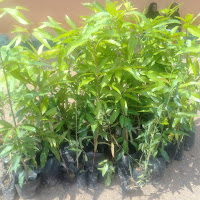Economic Demand And The Challenges Of Modern Farming Techniques In Nigeria
By Habu DanWaire
Nigeria has prioritized
agricultural development under its economic recovery and growth plan, which
seeks to create new jobs in labour-intensive sectors including agriculture,
boost agriculture’s GDP contribution to more
than 8% by 2020
Nigeria's wide range of climate
variations allows it to produce a variety of food and cash crops. But the
country is lacking behind in terms of more than farming techniques. Up till
now, the farmers are using all farming tools and techniques, that causing a lot
of setback to the country's economy.
According to experts agriculture
recorded a steady growth throughout the country’s recent recession and
supported macroeconomic stability against a backdrop of volatility in the
global oil market.
Over the past two decades,
Nigeria has effectively leveraged its abundance of natural resources and
harnessed the strength of its 200million strong population to become a key
nation both on the African continent and beyond.
70% per cent of Nigeria's
population is farmers. Farmers that
traditionally practise agriculture, a
way that many see as a setback to the country’s economic growth.
Of recent there is an
agricultural revolution in the country, many have gone back to the farm but a
lot have run away from it, because of the methods used in practice. The
question is, how are we going to get it right and when?
G4G asked some farmers in
Plateau, Adamawa and Kano states on the challenges of having modern farming
techniques and the way out.
Mr Sam Gyang a farmer in Riyom,
Plateau state said there is development in the provision of light farming tools
and improve seeds, but in the angle of machinery we far behind.
In kano Alhaji Sule Musa Kura has
been in the farming business for more than 3 decades and said farming in the
70s and 80s is far better because of the availability of mechanization tools
and political will. But from 2016 to date things are getting batter.
Malam Umaru Musa practices mixed
agriculture and live in Mayo ine Fufore local government, Adamawa state said
the aspect of crop production has increased but Animal production is decreasing
attributing the setback on population growth and poor political will.
The farmers all agreed that
political will and continuity as well as training on modern farming techniques,
on production, processing, storing and marketing must be addressed for the
country to get it right.






Comments
Post a Comment